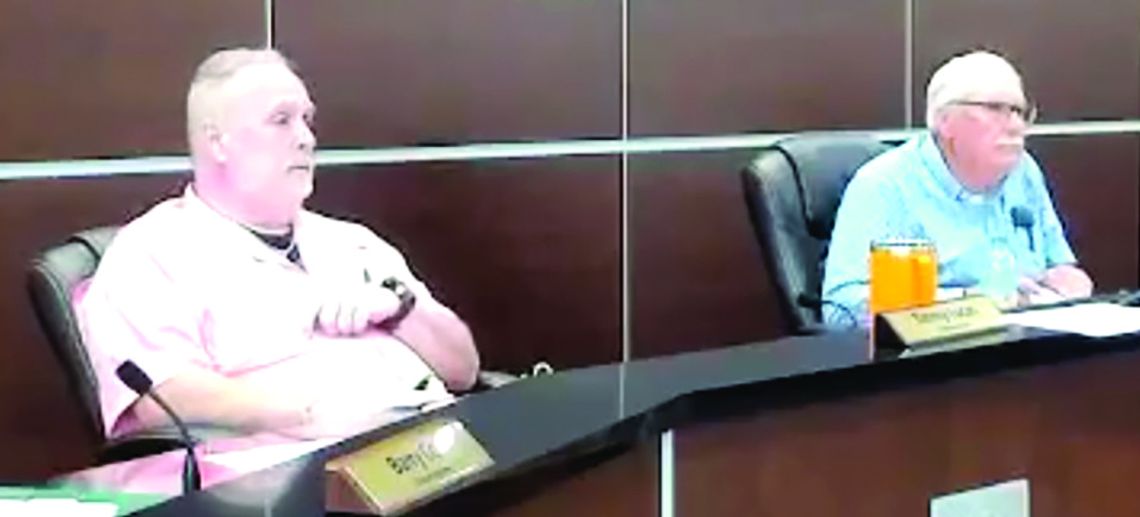New tax to be used in helping lower property taxes
Time is going be crucial for Ware County and City of Waycross officials to finalize an intergovernmental agreement for a proposed Floating Local Option Sales Tax to be put on the November ballot.
An agreement for the splitting of the five-year, one-cent sales tax must be in place 90 days before voting takes place.
The Floating Local Option Sales Tax (FLOST - named for its relation to the floating homestead exemption) is a new sales tax which can be levied up to 1 percent and collected county-wide. Funds are split between the county and cities based upon an intergovernmental agreement (IGA) and used for property tax relief.
“This tax will go directly towards property tax,” explained Ware County Tax Commissioner Roger Collins during the Monday, June 9 work session. “It will reduce the millage rates and property taxes. It is strictly for taxes and can’t be used to purchase anything else.
“It’s a savings to everybody. The tax will be paid by everyone who shops and buys something here.”
According to Collins, City of Waycross residents will receive a reduction off the gross twice while county residents will receive one reduction.
With FLOST in place last year, Collins said the county millage rate would have been 6.979 instead of 11.736 while the city mill would have dropped from 8.748 to 0.623.
The tax commissioner explained FLOST will cover an entire five-year period while SPLOST (Special Local Option Sales Tax) stops when its funding total is reached during its specified time frame.
The two governmental entities already are using a 58-42 split in favor of the county for LOST (Local Option Sales Tax - 10-year limit). SPLOST is split 60-40 in favor of the county.
“I don’t want to give more than they (city) should get,” said Commissioner Timmy Lucas.
“That’s a commission to commission negotiation,” responded Collins.
“It should be based on population by the percentage of the population percentage in the county to the city,” stated Lucas.
“SPLOST is based on population and LOST was negotiated,” offered County Manager James Shubert.
“If we’re doing an extra tax based off a tax already voted on it should go off the population and not off another tax bill,” Lucas said. “It should be 60-40 and not 58-42. I don’t want future taxes to be based off what a previous tax was.
“It should be based on the digest which is 60-40 which might be 61-39 now. I know a slew of people are moving out into the county.
“Our roads are looking bad and theirs are looking great ... we paved three of their roads last year. I want everything from here on out to be 60-40 based off population. They’ll (city) will get millons off the other (LOST) by itself.”
Collins, who was aked to get the cycling numbers for billing between the two entities, returned at the end of the regular meeting.
“The actual billing is 75 percent county and 25 percent city,” he told commissioners. “The sales tax for 2024 was 70-30.”
Commissioner Lucas asked Collins why that number is not used for the splitting.
“These splits need to be trashed on what the tax commissioner has said,” stated Lucas.
“The city will receive $6 million and the county $10 million with LOST and FLOST,” Collins said. “City taxpayers get a bigger reduction benefit because of city and county taxes.”
Lucas reiterated the 70-30 split for sales tax with, “I say everything should be 60-40. We’re giving them 10 percent more than they’re supposed to get ... that’s to their benefit.”
“I say 70-30,” responded County Chairman Elmer Thrift.
“That would bankrupt them and I would not do that to the city,” said Lucas.
Commissioner Jon Tindall, a former city council member, offered the city would have an arguement that most of the sales tax is generated inside the city limits.
Commissioners tabled the intergovernmental agreement until a meeting between the two entities could resolve the split.
“Work it out with the city so we can get it on the ballot,” said Collins. “There is a 90-day window for the November ballot to get it on there.”










